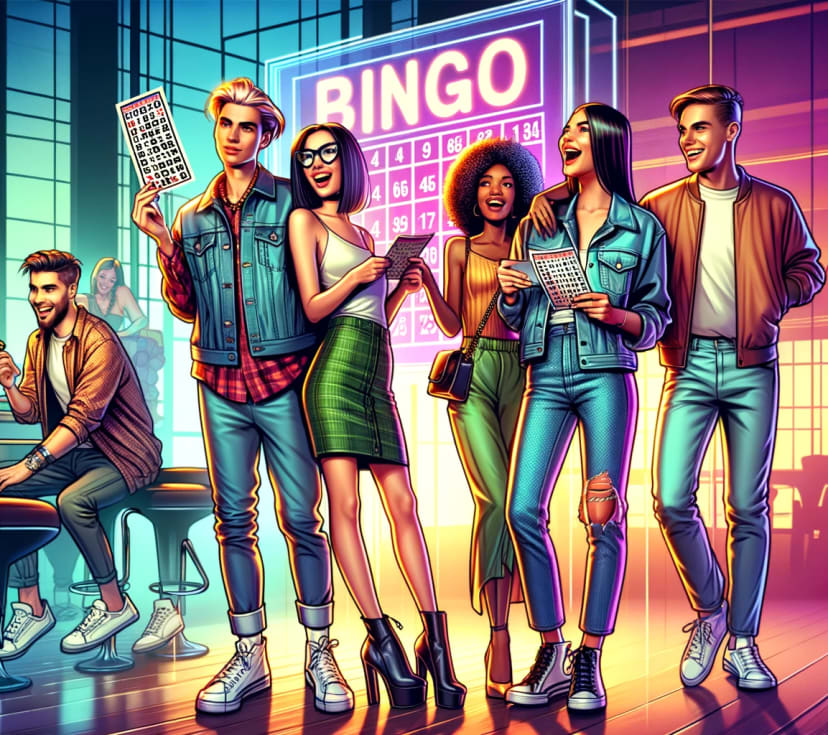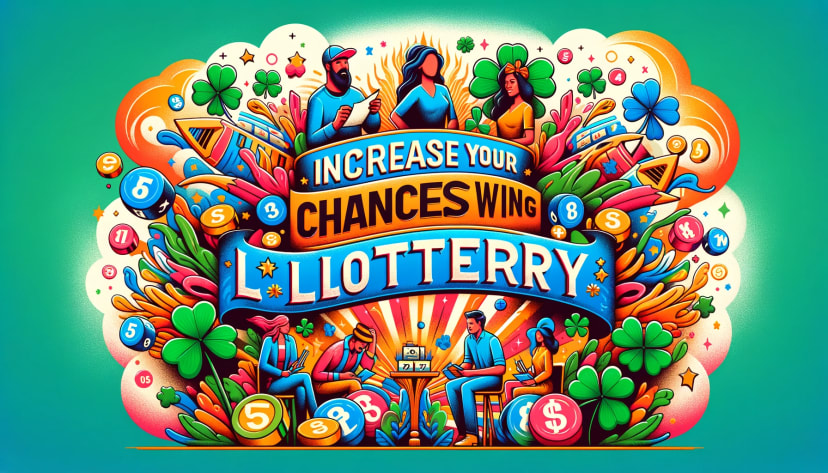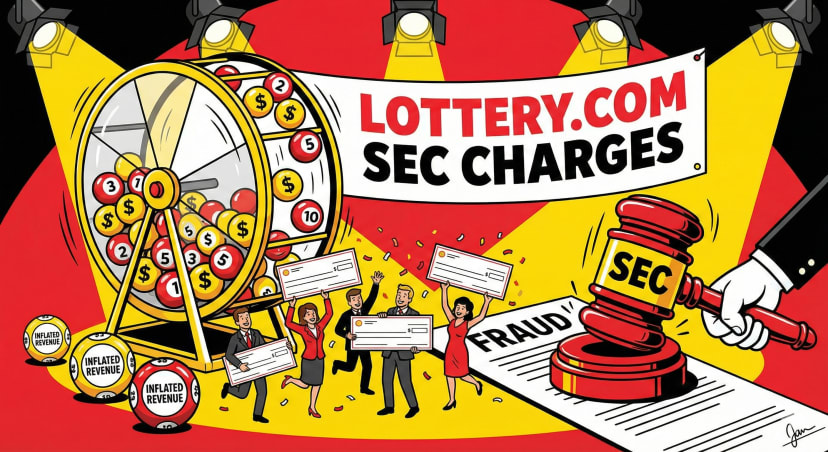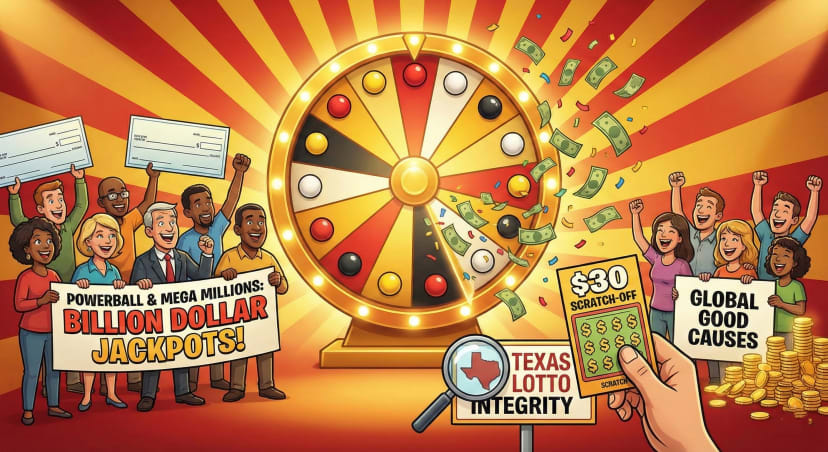Lottery vs Scratch Cards: Which Has Better Winning Odds?

Ever wondered if scratch cards or lottery tickets offer better odds of winning for players in the UK? Scratch cards can be enjoyed without spending a penny and are pure games of chance. However, many people, especially those playing online, prefer games where skill plays a part.
In terms of potential profit, lottery tickets often offer a greater payout than scratch cards. Unfortunately, the odds of winning the lottery are astronomically low, making it highly unlikely you'll ever hit the jackpot. Scratch cards, on the other hand, typically have smaller top prizes but offer more frequent payouts, making them a potentially better bet financially than regularly playing the lottery.
This article explains how scratch cards work, the typical odds of winning, how much you can potentially win, and how you'll be paid if you're lucky.
What are Scratch Cards?
Scratch cards, also known as scratch-offs or instant lottery tickets, are a type of game of chance that's similar to a national lottery but is significantly easier to play and offers quick prizes.Scratch card games are often referred to as 'instant games' for this very reason.
Both the designs and the specific games played with scratch cards can vary widely. Still, the fundamental process for winning is the same across most products: simply scratch off the silvery coating to reveal your prize.
In most cases, the prizes offered by scratch cards aren't directly comparable to the massive jackpots found in national lotteries. However, wins can start from as little as £1 and can reach thousands of pounds.
It's incredibly easy to get involved with scratch card games, as you can buy them at most newsagents, convenience stores, or from online casino sites. While a lottery ticket might cost £1 or £2, the price of some online scratch cards can range from £1 up to £10. The more expensive cards typically carry the potential for larger prizes.
Comparing Scratch Cards and Lottery Games for UK Players
Lotteries often involve selecting numbers from a predetermined pool of up to 69 digits.
After making your decision, you'll need to fill out a play slip with your chosen numbers and give it to a lottery representative. The clerk will enter your choices into a computerized system, which will then print a lottery ticket to match your slip.
Lottery drawings normally occur twice weekly, usually on Saturdays and Wednesdays. Lottery officials utilize a specialized machine pre-loaded with balls bearing all of the numbers during the draw.
The balls are released from the machine at random. You are awarded the jackpot if all the numbers printed on your ticket are an exact match for the numbers printed on one of the balls that the machine has pushed out. The sequence in which the numbers appear on your ticket is irrelevant.
If more than one individual guesses the winning numbers, the pot will be divided proportionally among them. If there is no lucky winner, the jackpot increases until the following drawing. A larger jackpot usually means more people will participate in the next draw in the hopes of winning a piece of the pie.
Understanding Scratch Card and Lottery Odds
Scratch Cards: A Game of Chance
Scratch cards offer a straightforward gamble: you buy a card, scratch off the surface, and see if you've won a prize. The odds of winning are determined by two factors: the total number of tickets produced and the number of prizes. For instance, if a game releases 20 million tickets and offers 6 million prizes, the odds of winning any prize are approximately 1 in 3.33. However, these odds vary as tickets are sold and prizes are claimed.
Many lottery organizations provide information on the number of claimed and unclaimed prizes, which can help you understand your current chances of winning. Generally, the odds of snagging the top prize in a scratch card game are long - often 1 in a million - while the odds of winning smaller prizes are more favorable.
Lottery Odds: A Deeper Dive
Lottery games, such as Lotto 6/49 or Powerball, require players to select numbers from a large pool, with winners determined through random draws. The odds of winning vary significantly based on the game's rules and the size of the number pool. For example, in Canada's Lotto 6/49, the odds of hitting the jackpot are 1 in 13,983,816. This requires matching all 6 numbers from a pool of 49.
In contrast, Powerball and Mega Millions in the United States use larger pools of 69 and 70 numbers, respectively. The odds of winning the Powerball jackpot are about 1 in 292.2 million, slightly better than the 1 in 302.5 million odds for Mega Millions.
Are Scratch Cards Better than the Lottery?
It's important to note that while the lottery offers bigger payouts, the odds of winning are much lower than scratch cards, where the worst-case scenario odds are 1 in 12. Both lotteries and scratch cards are designed in such a way that the smaller prizes are more frequently won. Your chances of selecting one correct number out of a group of six numbers are better than your chances of selecting all six numbers correctly.
Scratch cards have a significant discrepancy in the number of cards printed for the smaller rewards compared to the number of cards printed for the larger prizes. Consequently, most scratch cards with a winning ticket will only be eligible for smaller amounts.
Based on the odds of winning any prize in a lottery or scratch card, which are one in twenty-four and one in twelve, respectively, it's highly probable that you'll win a prize if you purchase one of these games at least once every twelve purchases.
It's worth remembering that the easiest prizes to win are $2. This means that the odds of 1 in 24 and 1 in 12 will most likely result in a $2 win. Additionally, investing the same amount of money in both lottery tickets and scratch cards will double your money on the latter.
FAQ
What Are Scratch Cards?
Scratch cards, also known as scratch-offs or scratchers, are simple games of chance popular in the UK. You scratch off a designated area to reveal symbols or numbers, hoping to match a winning combination. Prizes can range from a few pounds to substantial jackpots.
How Do Scratch Cards Work?
Playing scratch cards is straightforward. Purchase a card from a retailer, then use a coin or similar object to scratch off the covering. If the revealed symbols or numbers match a winning pattern specified on the card, you win a prize. It's a quick and easy way to potentially win some money.
What Are the Odds of Winning on a Scratch Card?
The odds of winning on a scratch card in the UK vary depending on the specific game. Generally, the odds are printed on the back of the card. For example, a card might have odds of 1 in 4 of winning any prize. Remember that these odds can change as prizes are claimed.
How Are Lottery Numbers Selected?
In the UK National Lottery, players typically select six numbers from a range of 1 to 59. You can choose your numbers manually or opt for a "Lucky Dip," where numbers are randomly selected for you. Once you've made your selection, you purchase a ticket to enter the draw.
How Often Do Lottery Draws Occur?
The UK National Lottery draws are held twice a week, on Wednesdays and Saturdays. During the draw, a machine randomly selects six main numbers and a bonus ball. These numbers determine the winners for each prize tier.
What Happens If Multiple People Win the Lottery?
If several players match all the winning numbers in the UK National Lottery, the jackpot is shared equally among them. If no one matches all the numbers, the jackpot rolls over to the next draw, potentially creating a larger prize fund.
What Are the Odds of Winning the Lottery?
The odds of winning the UK National Lottery jackpot are approximately 1 in 45,057,474. Other lottery games, like the EuroMillions, have different odds. Smaller prizes have significantly better odds of being won.
Are Scratch Cards or Lottery Tickets a Better Bet?
Scratch cards generally offer smaller, more frequent wins, while lottery tickets provide the chance of a much larger jackpot but with significantly lower odds. Which is a "better bet" depends on your preference: frequent small wins or the slim chance of a life-changing sum.
How Much Can You Win on Scratch Cards?
Scratch card prizes in the UK vary considerably, from £1 to hundreds of thousands, or even millions, of pounds. The price of the card usually reflects the potential prize; more expensive cards typically offer larger jackpots.
Is It Worth Playing Scratch Cards and Lottery?
Playing scratch cards and the lottery should be viewed as a form of entertainment, not a reliable source of income. Always gamble responsibly and only spend what you can afford to lose. Remember that the odds are always in favour of the operator.














